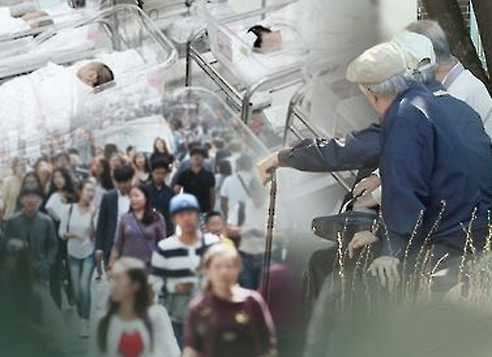South Korea's dependency ratio is expected to spike over the next 60 years in line with its fast aging population, becoming the highest among major advanced economies, a report said Thursday.
Asia's fourth-largest economy is forecast to have a dependency ratio of some 80 people in 2075, the highest among members of the Organization for Economic Cooperation and Development, according to the report by the National Assembly Research Service.

That means that 1.25 working-age people should support the livelihood of one senior citizen that year.
The ratio refers to the percentage of senior citizens aged 65 or older to 100 economically productive people aged 20-64. It serves as a measure of the pressure on a country's productive population.
As of 2015, South Korea's dependency ratio came to 19.6, which translates into 5.1 working-age people supporting one senior citizen. It was much lower than the OECD average of 27.6. Japan had the highest ratio of 47.2.
However, South Korea's dependency ratio is projected to reach 31.1 in 2025, 71.5 in 2050 and 80.1 in 2075, surpassing Japan's 77.2.
The income of South Korea's senior citizens, meanwhile, lags far behind that of other OECD member countries. South Korean seniors' income came to about 60 percent of the level of the total population in 2015, much lower than the OECD average of 86.6 percent.
The report said the government needs to overhaul the system for supporting senior citizens as the country's dependency ratio is predicted to rise at a fast pace due to its rapid population aging and low birthrate.
South Korea is forecast to become an aged society in 2017 with the ratio of people aged 65 and older hitting 14 percent and emerge as a super-aged society with the figure hovering above 20 percent in 2026. A country is defined as an aged society when more than 14 percent of its people are 65 or older.
South Korea also has one of the lowest birthrates in the world. The country's total fertility rate -- the average number of children a woman bears in her lifetime -- stood at 1.24 in 2015, far lower than the replacement level of 2.1 that would keep South Korea's population of 51 million stable. (Yonhap)








![[KH Explains] How should Korea adjust its trade defenses against Chinese EVs?](http://res.heraldm.com/phpwas/restmb_idxmake.php?idx=644&simg=/content/image/2024/04/15/20240415050562_0.jpg&u=20240415144419)










![[Today’s K-pop] Stray Kids to return soon: report](http://res.heraldm.com/phpwas/restmb_idxmake.php?idx=642&simg=/content/image/2024/04/16/20240416050713_0.jpg&u=)